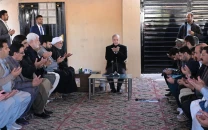Transparency in governance: Call for paradigm shift in policy
Implementation of right to information law is anything but up to the mark.

This was the consensus of participants of a round-table discussion held here on Friday.
Stressing the need for promoting a healthy debate on the right to information legislation, the participants said it can yield positive results in state organs, adding that this article was an important part of the constitutions in most democratic governments.
The theme of the discussion was ‘transparency in governance’ and it was organised by Individualland, an NGO.
“Pakistan, being an emerging democracy, also has this legislation as an integral part of its Constitution. However, its implementation is still not up to the mark,” they observed.
The participants also agreed that the concept of public accountability entails that the process should be transparent and the results should be known to the public.
Chairman of the Pakistan chapter of the Transparency International Syed Ali Gilani said that procurement rules can be used for minimising corruption.
“Conflict of interest was not in Pakistani laws but it was necessary for the composition of Security Exchange Commission laws which have conflict of interest clauses,” he said.
Gulmina Bilal Ahmad, a researcher, emphasised on the significance of the implementation of existing rules for curbing corruption.
“The National Accountability Bureau (NAB) is responsible for curbing corruption and not the Supreme Court as public perception is common that departments have been made non-functional by certain quarters,” she observed.
Head of NAB’s anti-corruption unit Aalia Rasheed said that the bureau is registering assets of all public office holders with cooperation of the Establishment Division, adding that people buying a property worth Rs50 million or more would now have to inform in advance. She was of the view that every department’s annual performance report should be made public so that transparency could be ensured.
Chief Administration Officer of the National Database and Registration Authority (Nadra) Brig (retd) Sajjad Hussain Shah, said that the authority was trying to make the process of Watan card distribution transparent.
Published in The Express Tribune, November 27th, 2010.



















COMMENTS
Comments are moderated and generally will be posted if they are on-topic and not abusive.
For more information, please see our Comments FAQ